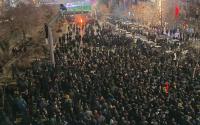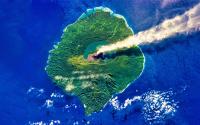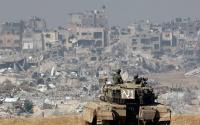Faisal BodiFriday March 28, 2003
Last month, when it became clear that the US-led drive to war was irreversible, I - like many other British journalists - relocated to Qatar for a ringside seat. But I am an Islamist journalist, so while the others bedded down at the £1m media centre at US central command in As-Sayliyah, I found a more humble berth in the capital Doha, working for the internet arm of al-Jazeera.
And yet, only a week into the war, I find myself working for the most sought-after news resource in the world. On March 23, the night the channel screened the first footage of captured US PoW's, al-Jazeera was the most searched item on the internet portal, Lycos, registering three times as many hits as the next item.
I do not mean to brag - people are turning to us simply because the western media coverage has been so poor. For although Doha is just a 15-minute drive from central command, the view of events from here could not be more different. Of all the major global networks, al-Jazeera has been alone in proceeding from the premise that this war should be viewed as an illegal enterprise. It has broadcast the horror of the bombing campaign, the blown-out brains, the blood-spattered pavements, the screaming infants and the corpses. Its team of on-the-ground, unembedded correspondents has provided a corrective to the official line that the campaign is, barring occasional resistance, going to plan.
Last Tuesday, while western channels were celebrating a Basra "uprising" which none of them could have witnessed since they don't have reporters in the city, our correspondent in the Sheraton there returned a rather flat verdict of "uneventful" - a view confirmed shortly afterwards by a spokesman for the opposition Supreme Council for the Islamic Revolution in Iraq. By reporting propaganda as fact, the mainstream media had simply mirrored the Blair/Bush fantasy that the people who have been starved by UN sanctions and deformed by depleted uranium since 1991 will greet them as saviours.
Only hours before the Basra non-event, one of Iraq's most esteemed Shia authorities, Ayatollah Sistani, had dented coalition hopes of a southern uprising by reiterating a fatwa calling on all Muslims to resist the US-led forces. This real, and highly significant, event went unreported in the west.
Earlier in the week Arab viewers had seen the gruesome aftermath of the coalition bombing of "Ansar al-Islam" positions in the north-east of the country. All but two of the 35 killed were civilians in an area controlled by a neutral Islamist group, a fact passed over with undue haste in western reports. And before that, on the second day of the war, most of the western media reported verbatim central command statements that Umm Qasr was under "coalition" control - it was not until Wednesday that al-Jazeera could confirm all resistance there had been pacified.
Throughout the past week, armed peoples in the west and south have been attacking the exposed rearguard of coalition positions, while all the time - despite debilitating sandstorms - western TV audiences have seen litte except their steady advance towards Baghdad. This is not truthful reporting.
There is also a marked difference when reporting the anger the invasion has unleashed on the Muslim street. The view from here is that any vestige of goodwill towards the US has evaporated with this latest aggression, and that Britain has now joined the US and Israel as a target of this rage.
The British media has condemned al-Jazeera's decision to screen a 30-second video clip of two dead British soldiers. This is simple hypocrisy. From the outset of the war, the British media has not balked at showing images of Iraqi soliders either dead or captured and humiliated.
Amid the battle for hearts and minds in the most information-controlled war in history, one measure of the importance of those American PoW pictures and the images of the dead British soldiers is surely the sustained "shock and awe" hacking campaign directed at aljazeera.net since the start of the war. As I write, the al-Jazeera website has been down for three days and few here doubt that the provenance of the attack is the Pentagon. Meanwhile, our hosting company, the US-based DataPipe, has terminated our contract after lobbying by other clients whose websites have been brought down by the hacking.
It's too early for me to say when, or indeed if, I will return to my homeland. So far this war has progressed according to a near worst-case scenario. Iraqis have not turned against their tormentor. The southern Shia regard the invasion force as the greater Satan. Opposition in surrounding countries is shaking their regimes. I fear there remains much work to be done.
· Faisal Bodi is a senior editor for aljazeera.net






